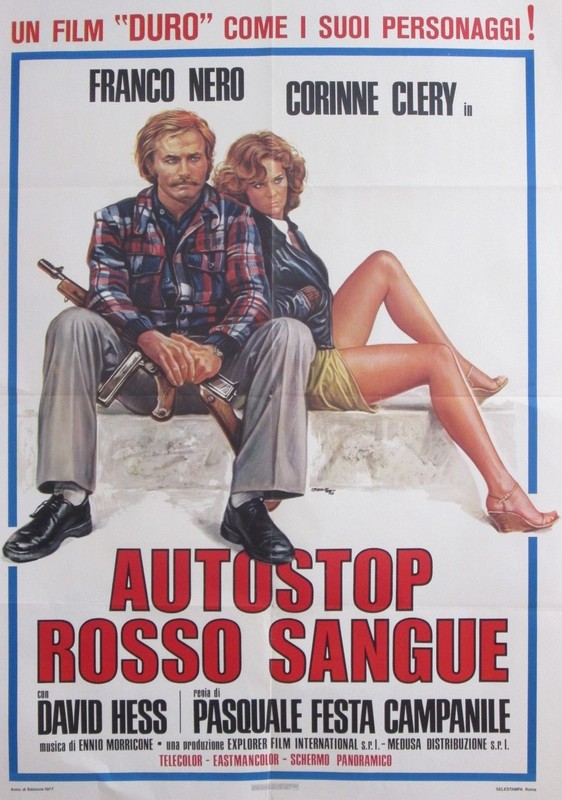 A standout entry in the category of Cinema du David Hess. The late Mr. Hess was one of the screen’s pre-eminent psychos, as proven by his work in LAST HOUSE ON THE LEFT (1972), THE HOUSE ON THE EDGE OF THE PARK (1980), SWAMP THING (1982) and HITCH-HIKE (Autostop rosso sangue), a fitfully sleazy Italian made thriller from 1977. Co-starring were the Italian cinema legend Franco Nero (who had previously appeared with Hess in 21 HOURS AT MUNICH) and the French sexpot Corinne Clery (THE STORY OF O), both of whom, like Hess, were called upon to deliver their respective attributes: Nero his smoldering intensity and Clery her sex appeal.
A standout entry in the category of Cinema du David Hess. The late Mr. Hess was one of the screen’s pre-eminent psychos, as proven by his work in LAST HOUSE ON THE LEFT (1972), THE HOUSE ON THE EDGE OF THE PARK (1980), SWAMP THING (1982) and HITCH-HIKE (Autostop rosso sangue), a fitfully sleazy Italian made thriller from 1977. Co-starring were the Italian cinema legend Franco Nero (who had previously appeared with Hess in 21 HOURS AT MUNICH) and the French sexpot Corinne Clery (THE STORY OF O), both of whom, like Hess, were called upon to deliver their respective attributes: Nero his smoldering intensity and Clery her sex appeal.
The director was the late Pasquale Festa Campanile (1927-86), a novelist and filmmaker (of WHEN WOMEN LOST THEIR TAILS and THE SEX MACHINE) who with this film hit an unexpected career high point. No, it’s not the “lost classic” it’s been sold as, but HITCH-HIKE (adapted, allegedly, from a novel called THE VIOLENCE AND THE FURY that doesn’t appear to actually exist) is an interesting take on any number of familiar exploitation movie tropes.
Walter Mancini (Nero) is a small-time reporter and bigtime drunken asshole who in the opening ten minutes fantasizes openly about killing his sexy wife Eve (Clery) and rapes her twice. They’re on a road trip through Northern California (actually the Abruzzo region of Italy), with Eve, wearing an extremely revealing minidress, driving (as Nero had broken one of his wrists before filming began) and pulling a camper behind them. When they happen upon a stalled car Eve invites its occupant, a curly haired fellow named Adam (Hess), to ride with them, unaware that (as an insert shot informs us) the car’s actual driver is slumped in the drivers’ seat with a bullet in his head. Characteristically, Walter introduces his wife to Adam as “a bit of a whore.”
Adam for his part wastes no time revealing his true nature, disrespecting Eve, pointing a pistol at her and Walter, shooting two cops and in general behaving like a David Hess character. He also has a suitcase filled with stolen cash, which piques the interest of Eve and especially Walter.
Recognizing a kindred spirit, Adam elects to hire Walter to write his memoirs, but things don’t go as planned, with a pair of Adam’s equally scummy sidekicks turning up to complicate matters, Eve using her sexual allure to string along both Adam and Walter, and a gang of teenybopper bikers harassing them on the road. It all leads to a profoundly dark, pessimistic denouement that recalls the bleak finales of Italian trash classics like THE GREAT SILENCE (1968) and RABID DOGS (1974), the latter of which has a great deal in common with the present film.
In HITCH-HIKE Hess proves, once again, that he was one of the most menacing screen presences of his time, dishing out brutality and foul language with a smarmy cackle and what may be the screen’s most exuberantly malevolent grin. Hess also stands out by virtue of the fact that he speaks plain English while Nero and Clery’s voices were dubbed (and, as tended to be the case with Italian trash pics of the seventies, quite poorly). Clery, at least, succeeds in holding her own with Hess, if only because of the copious full-frontal nudity she displays.
Pasquale Festa Campanile does a good job keeping the tension on boil, and dishing out a string of unexpected twists. The action scenes, alas, such as a DUEL-like chase through cliffside terrain and the climactic biker confrontation, are unexciting and repetitive, with Campanile relying overmuch on wide shots and eschewing close-ups (meaning no gear shifting or pedal stomping). The film fares much better in intimate scenes, in which the visuals assume a highly mobile John Cassavetes-like grace.
Being a novelist, Campanile insists on inserting a ham-fisted sociopolitical angle, evidenced in pompous conversations the principals have about homosexuality and masculinity. Yes, the narrative can be viewed as an evocation of male impotence expressed on the form of aggression toward the fairer sex, but the material works best simply as the sleazy thriller it was sold as.
Beyond that HITCH-HIKE is interesting for the oft-kilter string-based score by Ennio Morricone. A pitch-perfect symphony of apprehension and unease, it’s no exaggeration to call it one of finest Morricone scores not done for Sergio Leone, and it helps elevate a decent-if-flawed product to almost-great status.
Vital Statistics
HITCH-HIKE (Autostop rosso sangue)
Explorer Film ‘58/Medusa Distribuzione
Director: Pasquale Festa Campanile
Producers: Mario Montanari, Bruno Turchetto
Screenplay: Ottavio Jemma, Aldo Crudo, Pasquale Festa Campanile
(Based, supposedly, on a novel by Peter Kane)
Cinematography: Franco Di Giacomo, Giuseppe Ruzzolini
Editing: Antonio Siciliano
Cast: Franco Nero, Corinne Clery, David Hess, “John Loffredo” (Joshua Sinclair), Carol Puri, “Pedro Sanchez” (Ignazio Spalla), “Leon Lenor” (Leonardo Scavino), Monica Zanchi, Benito Pacifico, Angelo Ragusa, Luigi Birri, Robert Sommer, Ann Ferguson, Fausto Di Bella
